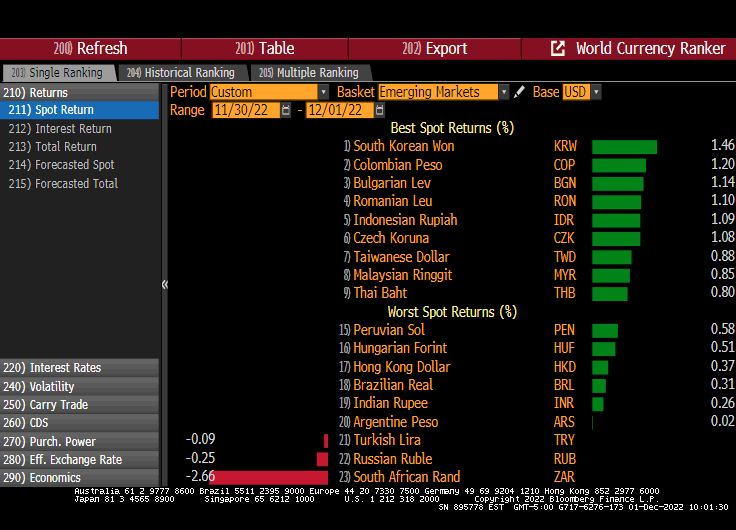Markets React to Year-End Surprises
December 01, 2022
Read Time 2 MIN
Market Liquidity
We are getting closer to year-end, when liquidity traditionally gets tighter, and this means that economic and political surprises might have a disproportionate impact on asset prices. We could see this effect yesterday after U.S. Federal Reserve (Fed) Chairman Powell’s presentation – which was not truly surprising substance-wise (given what was priced in by the Fed Funds Futures – a smaller 50bps hike in December), but which nevertheless spurred a sizable market rally. Today’s weaker than expected U.S. ISM survey1 – including yet another decline in the prices paid index (to mere 43.0) – is consistent with the slowing pace of rate hikes in the U.S.
South Africa Impeachment Crisis
News reports about potential impeachment proceedings against South Africa’s President Cyril Ramaphosa also produced an oversized reaction. The rand weakened by 266bps against U.S. dollar (as of 10:00am ET, according to Bloomberg LP – see chart below), 5-year CDS widened by 27bps, and the 10-year government bond yield jumped by 71bps. Observers are still divided as to whether this is a soft coup attempt or a sign that institutions work, at least in some emerging markets (EM), i.e., politicians/officials face consequences if they transgress. But many see a significant probability that Ramaphosa will not have to resign. Further, South Africa’s history shows that even if the president steps down, the transition process should be managed well. One big question – after the dust settles one way or another – is whether the current crisis will compromise South Africa’s reform agenda to the extent that threatens the country’s growth outlook and the fiscal adjustment process and debt sustainability.
Global Slowdown
The biggest “congregation” of today’s economic surprises was in the global growth area. China’s Caixin manufacturing PMI2 (Purchasing Managers Index) actually improved in November – imagine what could happen if the re-opening gains pace. Activity gauges in parts of EM Asia (India, Philippines, Thailand) looked good, and we also got a major unexpected spike in Hungary (to 54.7), which tells us that the central bank’s policy stance should remain tight for the time being. However, the situation in Hungary’s regional peers – Poland and the Czech Republic – is much more concerning. The November PMIs in both countries stayed deep in contraction zone, putting more pressure on central banks to stay on hold. Another massive downside surprise came from Brazil – the manufacturing PMI collapsed from 50.8 to 44.3, drawing attention to the elections’ impact on confidence (and hence, on the government’s ability to meet its fiscal targets). Stay tuned!
Chart at a Glance: South African Currency Hit By Political Turbulence

Source: Bloomberg LP.
1 The ISM survey is a monthly indicator of U.S. economic activity based on a survey of purchasing managers at more than 300 manufacturing firms. It is considered to be a key indicator of the state of the U.S. economy.
2 The Caixin manufacturing PMI is a gauge of activity in China's manufacturing sector.
Related Topics
Related Insights
February 26, 2024
January 04, 2024
October 27, 2023
PMI – Purchasing Managers’ Index: economic indicators derived from monthly surveys of private sector companies. A reading above 50 indicates expansion, and a reading below 50 indicates contraction; ISM – Institute for Supply Management PMI: ISM releases an index based on more than 400 purchasing and supply managers surveys; both in the manufacturing and non-manufacturing industries; CPI – Consumer Price Index: an index of the variation in prices paid by typical consumers for retail goods and other items; PPI – Producer Price Index: a family of indexes that measures the average change in selling prices received by domestic producers of goods and services over time; PCE inflation – Personal Consumption Expenditures Price Index: one measure of U.S. inflation, tracking the change in prices of goods and services purchased by consumers throughout the economy; MSCI – Morgan Stanley Capital International: an American provider of equity, fixed income, hedge fund stock market indexes, and equity portfolio analysis tools; VIX – CBOE Volatility Index: an index created by the Chicago Board Options Exchange (CBOE), which shows the market's expectation of 30-day volatility. It is constructed using the implied volatilities on S&P 500 index options.; GBI-EM – JP Morgan’s Government Bond Index – Emerging Markets: comprehensive emerging market debt benchmarks that track local currency bonds issued by Emerging market governments; EMBI – JP Morgan’s Emerging Market Bond Index: JP Morgan's index of dollar-denominated sovereign bonds issued by a selection of emerging market countries; EMBIG - JP Morgan’s Emerging Market Bond Index Global: tracks total returns for traded external debt instruments in emerging markets.
The information presented does not involve the rendering of personalized investment, financial, legal, or tax advice. This is not an offer to buy or sell, or a solicitation of any offer to buy or sell any of the securities mentioned herein. Certain statements contained herein may constitute projections, forecasts and other forward looking statements, which do not reflect actual results. Certain information may be provided by third-party sources and, although believed to be reliable, it has not been independently verified and its accuracy or completeness cannot be guaranteed. Any opinions, projections, forecasts, and forward-looking statements presented herein are valid as the date of this communication and are subject to change. The information herein represents the opinion of the author(s), but not necessarily those of VanEck.
Investing in international markets carries risks such as currency fluctuation, regulatory risks, economic and political instability. Emerging markets involve heightened risks related to the same factors as well as increased volatility, lower trading volume, and less liquidity. Emerging markets can have greater custodial and operational risks, and less developed legal and accounting systems than developed markets.
All investing is subject to risk, including the possible loss of the money you invest. As with any investment strategy, there is no guarantee that investment objectives will be met and investors may lose money. Diversification does not ensure a profit or protect against a loss in a declining market. Past performance is no guarantee of future performance.
PMI – Purchasing Managers’ Index: economic indicators derived from monthly surveys of private sector companies. A reading above 50 indicates expansion, and a reading below 50 indicates contraction; ISM – Institute for Supply Management PMI: ISM releases an index based on more than 400 purchasing and supply managers surveys; both in the manufacturing and non-manufacturing industries; CPI – Consumer Price Index: an index of the variation in prices paid by typical consumers for retail goods and other items; PPI – Producer Price Index: a family of indexes that measures the average change in selling prices received by domestic producers of goods and services over time; PCE inflation – Personal Consumption Expenditures Price Index: one measure of U.S. inflation, tracking the change in prices of goods and services purchased by consumers throughout the economy; MSCI – Morgan Stanley Capital International: an American provider of equity, fixed income, hedge fund stock market indexes, and equity portfolio analysis tools; VIX – CBOE Volatility Index: an index created by the Chicago Board Options Exchange (CBOE), which shows the market's expectation of 30-day volatility. It is constructed using the implied volatilities on S&P 500 index options.; GBI-EM – JP Morgan’s Government Bond Index – Emerging Markets: comprehensive emerging market debt benchmarks that track local currency bonds issued by Emerging market governments; EMBI – JP Morgan’s Emerging Market Bond Index: JP Morgan's index of dollar-denominated sovereign bonds issued by a selection of emerging market countries; EMBIG - JP Morgan’s Emerging Market Bond Index Global: tracks total returns for traded external debt instruments in emerging markets.
The information presented does not involve the rendering of personalized investment, financial, legal, or tax advice. This is not an offer to buy or sell, or a solicitation of any offer to buy or sell any of the securities mentioned herein. Certain statements contained herein may constitute projections, forecasts and other forward looking statements, which do not reflect actual results. Certain information may be provided by third-party sources and, although believed to be reliable, it has not been independently verified and its accuracy or completeness cannot be guaranteed. Any opinions, projections, forecasts, and forward-looking statements presented herein are valid as the date of this communication and are subject to change. The information herein represents the opinion of the author(s), but not necessarily those of VanEck.
Investing in international markets carries risks such as currency fluctuation, regulatory risks, economic and political instability. Emerging markets involve heightened risks related to the same factors as well as increased volatility, lower trading volume, and less liquidity. Emerging markets can have greater custodial and operational risks, and less developed legal and accounting systems than developed markets.
All investing is subject to risk, including the possible loss of the money you invest. As with any investment strategy, there is no guarantee that investment objectives will be met and investors may lose money. Diversification does not ensure a profit or protect against a loss in a declining market. Past performance is no guarantee of future performance.

